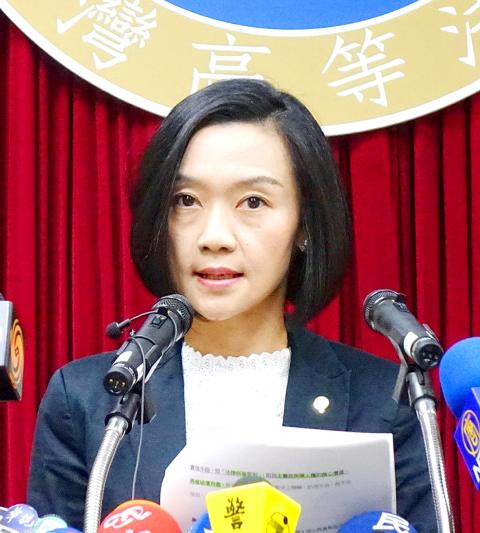The Taiwan High Court yesterday found former president Ma Ying-jeou (馬英九) guilty of leaking classified information obtained from Special Investigation Division (SID) wiretaps of two top lawmakers in 2013.
Ma is the second former Taiwanese president to be convicted of a crime, following former president Chen Shui-bian (陳水扁), since direct presidential elections started in 1996.
Overturning the Taipei District Court’s not guilty verdict delivered on Aug. 25 last year, the High Court said Ma contravened the Communication Security and Surveillance Act (通訊保障及監察法) and the Personal Information Protection Act (個人資料保護法), and was guilty of leaking confidential information under the Criminal Code.

Photo: Fang Pin-chao, Taipei Times
He was sentenced to four months in jail, which can be commuted to a fine of NT$120,000.
Ma said he would appeal the ruling.
An investigation found that Ma had on Aug. 31, 2013, instructed then-prosecutor-general Huang Shih-ming (黃世銘) to hold a meeting regarding transcripts from telephone wiretapping, which were obtained during a judicial investigation into alleged improper lobbying involving Democratic Progressive Party (DPP) caucus whip Ker Chien-ming (柯建銘) and then-legislative speaker Wang Jin-pyng (王金平) of the Chinese Nationalist Party (KMT).
The probe found that Ma then divulged the classified information from the transcripts of a conversation between Ker, Wang and others to then-premier Jiang Yi-huah (江宜樺) and then-Presidential Office deputy secretary-general Lo Chih-chiang (羅智強).
During the trial, Ma claimed “special presidential executive powers,” which he said granted him the right to inquire about ongoing criminal investigations to prepare for potential crises that could destabilize the government.
Ma argued that he had the right to do so based on Article 44 of the Constitution, which states the president has the right to handle a dispute between two or more of the five branches of government.
However, the High Court ruled that the 2013 investigation into Ker and Wang did not involve a dispute between two or more branches of government and Ma was therefore not entitled to exercise the executive power.
Together with the new interpretation, the High Court judges ruled that there was clear evidence that Ma leaked confidential information from the investigation to Jiang and Lo.
“Ma was the nation’s leader at the time, but he had seriously undermined the Constitution and disregarded the rule of law, and clearly is not a model example for people to follow,” the High Court ruling said.
“The Constitution provides guarantees for the basic rights of the people, which the nation’s governmental offices and officials shall not infringe upon,” presiding judge Chiang Chen-yi (江振義) said.
“Ma, as head of the government, should have endeavored to uphold the constitutional framework and the rule of law,” Chiang said.
Huang, who led the now-defunct SID of the Supreme Prosecutors’ Office, was forced to resign from his post in March 2014 and was convicted in 2015 of divulging confidential information to Ma and Jiang.
Revelation of the SID’s wiretapping and secret surveillance of top political figures sparked a firestorm. Ma was accused of pursuing a personal vendetta against Wang and Ker, which led to the “September strife” of 2013, and subsequently to discord and infighting within the KMT.

The Ministry of Foreign Affairs (MOFA) yesterday said it is closely monitoring developments in Venezuela, and would continue to cooperate with democratic allies and work together for regional and global security, stability, and prosperity. The remarks came after the US on Saturday launched a series of airstrikes in Venezuela and kidnapped Venezuelan President Nicolas Maduro, who was later flown to New York along with his wife. The pair face US charges related to drug trafficking and alleged cooperation with gangs designated as terrorist organizations. Maduro has denied the allegations. The ministry said that it is closely monitoring the political and economic situation

UNRELENTING: China attempted cyberattacks on Taiwan’s critical infrastructure 2.63 million times per day last year, up from 1.23 million in 2023, the NSB said China’s cyberarmy has long engaged in cyberattacks against Taiwan’s critical infrastructure, employing diverse and evolving tactics, the National Security Bureau (NSB) said yesterday, adding that cyberattacks on critical energy infrastructure last year increased 10-fold compared with the previous year. The NSB yesterday released a report titled Analysis on China’s Cyber Threats to Taiwan’s Critical Infrastructure in 2025, outlining the number of cyberattacks, major tactics and hacker groups. Taiwan’s national intelligence community identified a large number of cybersecurity incidents last year, the bureau said in a statement. China’s cyberarmy last year launched an average of 2.63 million intrusion attempts per day targeting Taiwan’s critical

‘SLICING METHOD’: In the event of a blockade, the China Coast Guard would intercept Taiwanese ships while its navy would seek to deter foreign intervention China’s military drills around Taiwan this week signaled potential strategies to cut the nation off from energy supplies and foreign military assistance, a US think tank report said. The Chinese People’s Liberation Army (PLA) conducted what it called “Justice Mission 2025” exercises from Monday to Tuesday in five maritime zones and airspace around Taiwan, calling them a warning to “Taiwanese independence” forces. In a report released on Wednesday, the Institute for the Study of War said the exercises effectively simulated blocking shipping routes to major port cities, including Kaohsiung, Keelung and Hualien. Taiwan would be highly vulnerable under such a blockade, because it

Conflict with Taiwan could leave China with “massive economic disruption, catastrophic military losses, significant social unrest, and devastating sanctions,” a US think tank said in a report released on Monday. The German Marshall Fund released a report titled If China Attacks Taiwan: The Consequences for China of “Minor Conflict” and “Major War” Scenarios. The report details the “massive” economic, military, social and international costs to China in the event of a minor conflict or major war with Taiwan, estimating that the Chinese People’s Liberation Army (PLA) could sustain losses of more than half of its active-duty ground forces, including 100,000 troops. Understanding Chinese